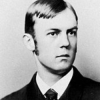Charles Horton Cooley

Charles Horton Cooley
Charles Horton Cooleywas an American sociologist and the son of Thomas M. Cooley. He studied and went on to teach economics and sociology at the University of Michigan, and he was a founding member and the eighth president of the American Sociological Association. He is perhaps best known for his concept of the looking glass self, which is the concept that a person's self grows out of society's interpersonal interactions and the perceptions of others...
NationalityAmerican
ProfessionSociologist
CountryUnited States of America
blow men self
One of the great reasons for the popularity of strikes is that they give the suppressed self a sense of power. For once the human tool knows itself a man, able to stand up and speak a word or strike a blow.
hero self giving
If youth is the period of hero-worship, so also is it true that hero-worship, more than anything else, perhaps, gives one the sense of youth. To admire, to expand one's self, to forget the rut, to have a sense of newness and life and hope, is to feel young at any time of life.
ambition passion self
The passion of self-aggrandizement is persistent but plastic; it will never disappear from a vigorous mind, but may become morally higher by attaching itself to a larger conception of what constitutes the self.
hero believe self
There is perhaps no sort of self more subject to dangerous egotism than that which deludes itself with the notion that it is not a self at all, but something else. It is well to beware of persons who believe that the cause, the mission, the philanthropy, the hero, or whatever it may be that they strive for, is outside of themselves, so that they feel a certain irresponsibility, and are likely to do things which they would recognize as wrong if done in behalf of an acknowledged self.
reflection self suffering
In the days of witchcraft it used to be believed that if one person secretly made a waxen image of another and stuck pins into the image, its counterpart would suffer tortures, and that if the image was melted the person would die. This superstition is almost realized in the relation between the private self and its social reflection. They seem to separate but are darkly united, and what is done to the one is done to the other.
doubt selfishness purpose
Selfishness of the stable or rigid sort is as a rule more bitterly resented than the more fickle variety, chiefly, no doubt, because, having more continuity and purpose, it is more formidable.
ideas self mind
The social self is simply any idea, or system of ideas, drawn from the communicative life, that the mind cherishes as its own.
self giving feelings
If love closes, the self contracts and hardens: the mind having nothing else to occupy its attention and give it that change and renewal it requires, busies itself more and more with self-feeling, which takes on narrow and disgusting forms, like avarice, arrogance and fatuity.
thinking self games
Society is an interweaving and interworking of mental selves. I imagine your mind and especially what your mind thinks about my mind and what my mind thinks about what your mind thinks about my mind. I dress my mind before you and expect that you will dress yours before mine. Whoever cannot or will not perform these feats is not properly in the game.
struggle passion self
The literature of the inner life is very largely a record of struggle with the inordinate passions of the social self.
travel vacation self
To get away from one's working environment is, in a sense, to get away from one's self; and this is often the chief advantage of travel and change.
american-sociologist effective fact general human organized social
The general fact is that the most effective way of utilizing human energy is through an organized rivalry, which by specialization and social control is, at the same time, organized co-operation.
children home evil
Simplicity is a pleasant thing in children, or at any age, but it is not necessarily admirable, nor is affectation altogether a thing of evil. To be normal, to be at home in the world, with a prospect of power, usefulness, or success, the person must have that imaginative insight into other minds that underlies tact and savoir-faire, morality and beneficence. This insight involves sophistication, some understanding and sharing of the clandestine impulses of human nature. A simplicity that is merely the lack of this insight indicates a sort of defect.
greed consciousness consumerism
It is partly to avoid consciousness of greed that we prefer to associate with those who are at least as greedy as we ourselves. Those who consume much less are a reproach.